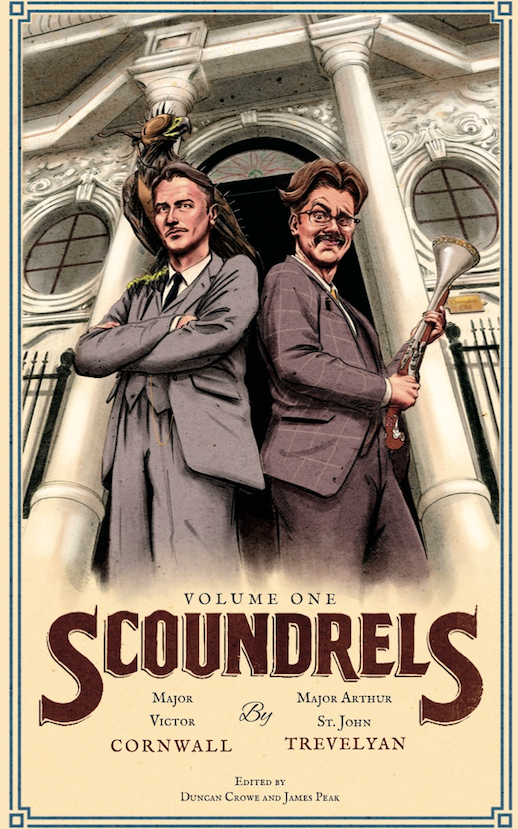'Humour is at the heart of most male friendships': how two men turned their banter into a book

Filmmaker Duncan Crowe and radio producer James Peak have channelled sixteen years of insults, banter and takedowns into a fast-selling independent debut novel, Scoundrels. It’s been a “pretty crazy” couple of weeks for the two friends; having signed to a major book distributor, almost sold out their first print run and had Gieves & Hawkes host their launch party. "We’re in happy shock," says Peak. " It’s been very surprising for something that started out as little more than a private joke.”
The duo first met when they both turned up to work at a television production company in 2001. “We clicked immediately,” remembers Crowe, “James has the same sense of humour as me, albeit housed in a much larger body – we hit the ground running. We quickly realised that we could crack jokes about each other without hurting feelings, which is a sign you’re at ease.”
Peak agrees: “Actually, he is constantly hurting my feelings. I had to decide either to end the friendship or develop a thick skin. Now I've got skin like a jockey's b******s.”

Whereas women may tease each other but remain respectful of certain subjects – physical deficiencies, phobias, style choices – as off-limits, the two elderly adventurers who narrate Scoundrels very definitely do not. This clearly comes from the authors' own experience. “Male banter can be very competitive and cruel,” James explains. “Boys will strive to out-say and out-do each other, so it becomes a combat sport and the jokes get nearer and nearer the knuckle. But in its defence there is a real creative freedom in having absolutely nothing you can't say to each other.”
Scoundrels was born when, with no warning, Peak sent Crowe an e-mail one day, writing as a disreputable spy “accusing him of stealing a very valuable watch”. Just half an hour later, Crowe, writing as another old spy, replied with a blistering accusation of embezzlement from a charity for orphans. Over the next two and a half years, they developed the characters of Major Cornwall and Major Trevelyan and their panda-hunting, Everest-climbing, Nazi-castle-storming ways that spanned an adventure across the latter half of the twentieth century.
“We didn't even talk to each other about the emails for the first six months writing, and by then we had a book's worth of material," says Crowe. "So it was pretty obvious what we had to do.” They took the e-mails, went down the pub, and turned the material into a jointly-penned book.
"The story developed as we went along so neither of us knew what was going to happen next. It was immensely satisfying to receive an email from James' Major, as I wanted to know what appalling things had happened to my character this time."
Crowe says that writing the novel satisfying on a personal as well as creative level: “Getting a laugh from someone is always gratifying – but even more so when you respect their sense of humour. It’s a kind of validation. You make another bloke laugh who is your peer and their laughter is a recognition of truth. It’s good for the soul.”
Peak agrees: “I’d say humour is at the heart of most male friendships. Some blokes get together to play squash, some go down the pub, others tinker with motorbikes, but a lot of that time they are thinking ‘how can I make these idiots laugh?’"
If that sounds basic, it's also vital – research frequently shows that isolation and loneliness are key health issues for men under 65. Men are particularly bad at keeping friendships running when mid-life pressures hit: unlike women, they aren't like to reach for the phone for a chat or send an off-the-cuff email to a buddy. In these cases, throwaway humour can be a permanent bridge, as Peak and Crowe discovered.
“I recently went out with Duncan and some other friends to the pub and for four hours it was non-stop," recalls Peake. "I can’t remember a single thing any of us said; it was by turns grumpy, insulting, hilarious, but throwaway. It was therapy essentially."
Scoundrels captures the essence of this humour as therapy. It celebrates a blokey, showboating spirit, outrageous boastfulness and sheer idiocy as elements that are vital to male happiness. Crowe sums it up when he says: “I don’t think we’re doing anything different from most blokes I know- apart from James and I have turned it into a book.”
Scoundrels Volume One is published by Black Door Press and available to buy now at www.blackdoorpress.com, and on Amazon.


